|
TRANSLATE THIS ARTICLE
Integral World: Exploring Theories of Everything
An independent forum for a critical discussion of the integral philosophy of Ken Wilber
 David Christopher Lane, Ph.D.
Professor of Philosophy, Mt. San Antonio College Lecturer in Religious Studies, California State University, Long Beach Author of Exposing Cults: When the Skeptical Mind Confronts the Mystical (New York and London: Garland Publishers, 1994) and The Radhasoami Tradition: A Critical History of Guru Succession (New York and London: Garland Publishers, 1992). David Christopher Lane, Ph.D.
Professor of Philosophy, Mt. San Antonio College Lecturer in Religious Studies, California State University, Long Beach Author of Exposing Cults: When the Skeptical Mind Confronts the Mystical (New York and London: Garland Publishers, 1994) and The Radhasoami Tradition: A Critical History of Guru Succession (New York and London: Garland Publishers, 1992).
THE AGNOSTICS
Thinkers in an Indeterminate Cosmos
Introduction |
Isaiah Berlin |
Charles Darwin |
John Dewey |
Enrico Fermi |
David Hume |
Edmund Husserl |
Thomas Henry Huxley |
Thomas Kuhn |
Lynn Margulis |
John Maynard Keynes |
G.E. Moore |
Karl Popper |
Michael Schmidt-Salomon |
Herbert Spencer |
Leo Szilard
JOHN DEWEYChristopher ChanJohn Dewey was an American philosopher who was a pioneer in functional psychology and one of the early founders of the progressive movement in education in the United States. Dewey was born on October 20, 1859, in Burlington Vermont to Archibald Sprague Dewey and Lucina Artemisia Rich. Dewey attended Burlington public schools where he excelled as a student, and by the age of 15, he enrolled at the University of Vermont. While in college he enjoyed studying philosophy from Professor Henry Augustus Pearson Torrey. This is where his love for philosophy stemmed from. He graduated from the University of Vermont second in his class with a bachelor's degree in 1879. 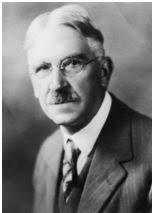 John Dewey Upon graduating his cousin helped him land a job teaching at a seminary in Pennsylvania. After about two years he was laid off and decided to obtain a doctorate in philosophy from John Hopkins University in 1884. Following this, he began to teach philosophy and psychology at the University of Michigan. While teaching at the University of Michigan, his interests began to shift to a new form of psychology that was being developed by Granville Stanley Hall and William James. Their psychology focused on evolutionary psychology and child development. While Dewey studied Hall and James' new psychology, he began to develop the philosophy of education that would fulfill the needs of an ever-changing democratic society. Later he left the University of Michigan and began to teach philosophy at the University of Chicago, and this was where he began to develop his progressive approach to education. Continuing the pattern of switching schools to teach at, he eventually left Chicago and joined the Ivy league to teach at Columbia University. He spent the majority of his career at Columbia University which is where he wrote his most famous work, Experience and Nature. Many of his subsequent writings included vast topics such as aesthetics, politics, and religion. Although he wrote about these vast topics, there was one basic theme among all his works, it was his belief that a democratic society of well-informed and civil engagers was the best way of promoting human interests. Dewey's philosophy on education was that education and learning are social, interactive processes. He argued that school itself is a social institution and that social reform from time to time should take place. Furthermore, his philosophy was students should be in an environment where they are allowed to fully immerse themselves in the curriculum, meaning they should be able to interact and experience what they are being taught, and all students should have the opportunity to take part in their own learning. His beliefs in the idea of democracy are expressed in his philosophy of education, he believed that education is not only a place to acquire knowledge but to also learn how to live. Dewey believed the purpose of education was not to acquire a set of skills, but instead to allow one to realize their full potential and how to utilize those skills for the good of all. His approach was known as child-centered, meaning that the education system should have an emphasis on the student's needs and interests. In order for education to be child-centered, Dewey introduced an interdisciplinary curriculum that focuses on the connection of subjects. Dewey's curriculum allows students to freely move in and out of classrooms as they find what they are most interested in, allowing them to form their own paths to gaining and utilizing their knowledge. In 1894, Dewey and his wife Harriet decided to start their own primary school with Dewey's way of child-centered education. His school was called the University Elementary School, at the University of Chicago. His overall goal for this school was to test his theories on how education should be taught. Later on, Harriet was fired by the university president and Dewey left the school as well. Dewey along with several of his other colleagues founded the New School for Social Research in 1919. New School was another experimental school that had an emphasis on the free exchange of intellectual ideas in the arts and social sciences. After the experiment in the 1920s, Dewey went all around the world to schools to give lectures on educational reform. When he went to Russia he was impressed by the Russian Educational system: that education should focus on students' interaction in the present, but not completely dismissing lessons we can learn from the past. Dewey's contribution to the education system was huge; he not only reimagined how learning should be, but also the role that the teacher should play within that process. Teachers today should try to follow Dewey's theories of education in order to help their students. Dewey also made an impact on functional psychology, which focuses on the purpose of behavior that has evolved over years of human existence. Functionalists sought to explain the mental process in a more systematic manner and the purpose of human consciousness and behavior. Dewey's view of Functionalism was heavily influenced by Charles Darwin's theory of evolution. The movement of Functionalism was in direct opposition to Edward Titchener's theory of structuralism, which focused on the conscious mind rather than human behavior. Dewey published a book on his theories of functionalism, The Reflex Arc Concept in Psychology; this book was widely considered the first major step towards establishing the functionalist school. His book went against the traditional stimulus-response understanding of the reflex arc. He believed that this approach was flawed because it ignored the progression of human behavior and how it was significant in human adaptation. On the contrary, Dewey believed that what served as a “stimulus” and what as a “response” depends on one's interpretation of the situation. The work that Dewey and his associates had on functional psychology helped stimulate Dewey's theory of a progressive school, driving it forward. Eventually Functionalism lost its glory in psychology as many other schools of thought for psychology began to emerge. Although Functionalism itself is not studied today, many psychologists still study its core principles such as the evolutionary functions of consciousness. John Dewey felt that education would also progressively move the young away from mythology and religion. He envisioned a time where outdated dogmatisms would be replaced by a more scientific understanding and attitude. His 1934 book, A Common Faith, elaborates on his more skeptical prognostications. As Tom Shipka explains, “John Dewey assured his readers that traditional religion was drifting into oblivion and that it would soon be a matter of interest only to history buffs.” Dewey felt strongly that with the advent of greater scientific literacy individuals would no longer be able to sustain beliefs in a heaven, a risen Jesus, miracles, and the like. Rather, there would be a new secular and humanist outlook that would replace outdated religions. But as Shipka points out, this didn't happen: “Where did Dewey go wrong? He assumed that just as the automobile had supplanted the horse and buggy, so science would supplant religion. The writing was on the wall, so to speak. Astronomy had discredited "ascent into heaven." Geology had discredited creation in six days. Biology had dispatched the soul and the afterlife. Anthropology, history, and literary criticism had shown that revered religious figures and their deeds, if founded in fact at all, were embellished to the point of fiction. And psychology had shown that mystical and religious experience had a natural explanation. As a result, Dewey expected that more and more educated people would abandon religion and its supernatural cast (God, salvation, grace, prayer, heaven, hell, the sacraments, clergy, revelation, the devil, etc.).” Even though John Dewey's prophecy about a future agnostic society didn't pan out, his ideas did have a lasting influence and it is clearly obvious today that being an unbeliever is much more widely accepted, even if there are many who still hold to various religious creeds. If you are most interested in Dewey's works on education a book you should definitely read is The Child and the Curriculum. This book examines the many competing theories of education, but he also examines the child's world and how it operates. If you wish to learn more about John Dewey's theories on psychology I recommend reading, Human Nature and Conduct. This book dives into Dewey's principles of his pragmatic philosophy of developmental and social psychology. This work is most notable for its departure from contemporary theories of psychology. To learn more about John Dewey's life a great book is, The Life and Mind of John Dewey, by author George Dykhuizen. Further Reading1. How we Think 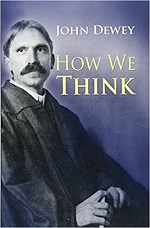 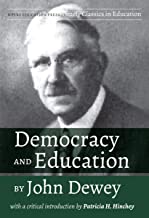 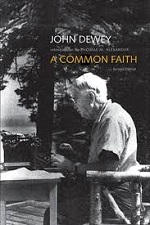 FROM THE INTRODUCTION | DAVID LANE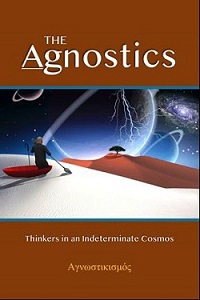
Often in the philosophy classes I have taught in undergraduate and graduate school, I would bring up this point of “unknowingness.” Pointing to a crumpled piece of writing paper, I would ask the class, “What is this?” Almost in unison, the students would respond, "A piece of paper." Taking this as my cue to lead into a deeper philosophical investigation of materialism, I probed further, "Yes, but what is that?” Catching my drift, one student invariably answered, “Oh, it is actually a transformed sheet of wood.” Not wanting them to stop there, I asked, “And wood is made of what?” “It's comprised of molecules," the more scientifically oriented students would shout. Connecting to the now forgotten inner space ride at Disneyland, which takes one through an imaginary voyage inside a snowflake molecule, I queried, “But what is a molecule made of.” By this time, we had gotten down to the subatomic level, and our words began to betray our modicum of knowledge (electrons, protons, quarks, lucky charms, superstring). The final question I asked was quite simple, but given the line of investigation it led to some severe complications: What is matter? Well, it should be obvious to the reader as it was to my class and to myself that there's only one truly appropriate response, “I don't know.” Now, this is exactly the response not only of most mystics, but most quantum physicists as well. As Sir Arthur Eddington, the distinguished astronomer put it, “Something unknown is doing we don't know what!” To be sure, mystics have said that the world (or matter) is nothing but consciousness. But, what is consciousness? Not even a sage as enlightened as Ramana Maharshi of South India could answer that question. To such queries, Ramana would often sit in silence. Ultimately, matter leads to consciousness and consciousness to God or Nature (with a capital N) and both to Mystery. However, no matter how you define it, slice it, categorize it, blend it, intuit it, the fact remains that Reality is a Mystery, and nobody apparently (not me, not you, not Einstein) knows what that Reality is. We are sitting right in the middle of the Mystical Dimension.
Comment Form is loading comments...
|